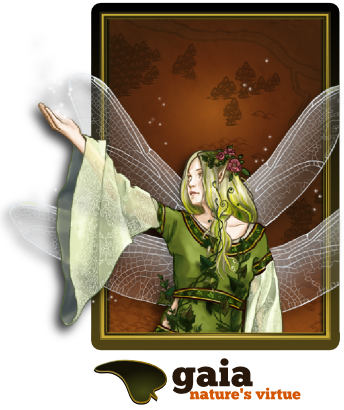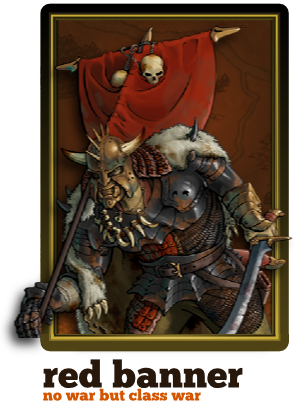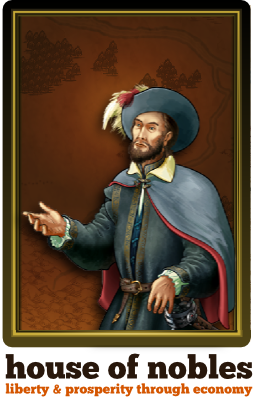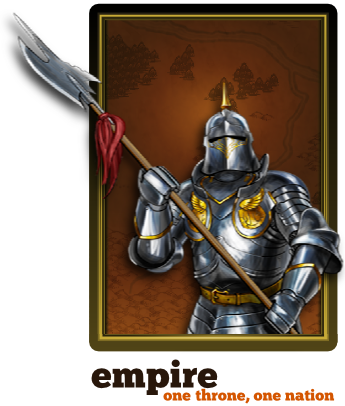Story
Notice: Only Gaia & Red banner are "finished" this far, but even they need some lingual love...
World
In a quiet corner of the known universe a distant planet orbits its star just like any other might. A single yet diverse vast continent, surrounded by a mighty ocean, makes up the bulk of the known traversable terrain. There are islands of course, scattered about along the coastlines and some even further out to sea, but most known life dwells on the one large landmass that most refer to as Yote; an old word lost in time. When compared to other planetary systems not far away, the world of Irdiya has been slow when it comes to technological advancements. When it comes to the progression of mystic knowledge and an awareness of the elements of magic; however, the civilizations of Irdiya could be said to know no equal.
How the world came to be is not known and the ancient history of Irdiya remains a mystery still. There are many myths and theories of course, depending on what particular sect or individual you may happen to ask, but since studies of both anthropology and archaeology are only yet emerging disciplines the secrets of the great planet's past have yet to be fully unveiled. Life on Irdiya is much as it is on any other world experiencing its middle ages. There's nothing particularly special about it, even if it does have its own distinct cultures and unique sentient species.
Due to the world's vast size there are many varied peoples, civilizations, and ways of life. There are those that worship the gods, others that resort to science, and even those that find an amicable coexistence between the two. For some the acquisition of wealth itself is the sole meaning of life while others still believe it is living for the greater good of society as a whole. Mathematics, mythical rituals, primitive machinery, the wielding of steel and the casting of magic all coexist. Even though some species may see the world as black and white most of the peoples have come to understand that cultural diversity blends right and wrong into the purest shade of grey. On Irdiya all forms of morality seem to exist. Depending on ones perspective, it is either a matter of belief and conviction or the proper lack thereof.
The world of Irdiya, like any other, has had its times of peace and its times of conflict. Through the ages the smaller wars have long been forgotten and the greater ones are still sung about by bards, acted out by performers, and bragged about by boastful men who no longer know which side their long dead ancestors fought for. Confrontations still arise between the factions. Alliances have come and gone and new ones are still made between the various species and cultures. Loyalty is earned through blood and iron or bought with coin and skin. Every warrior is ready to die for something, every lady prepared to feign love for a cause, every heart has its destiny, and even the meekest of Irdiya's creatures can sway the course of history.
Time has served Irdiya with the gifts of some scientific advancements in the fields of medicine, agriculture and crude mechanical know how. The once desolate world has entered a new era where every tract of hospitable land, and some not so hospitable, is contested. Habitable space is becoming overpopulated and as a result resources are scarce and the survival of the fittest has become the guiding star. Some say the ancient prophecies are about to come true as new conflicts color the skies red with fire and paint the land crimson with blood. Troubling signs, like the dead having begun to walk the land again, have fueled the already wide spread chaos. Conflicts between, as well as within, city states and kingdoms have become commonplace and more than one brother has been forced to kill another in the seemingly never ending strife among even families.
The reasons for conflict varies. For some it's the right to exist, for others it's better living conditions and freedom, and for what seems to be a great majority it's about pure greed. Battles are fought between religious faiths, for ideological and ethical conviction, for land, for pride, in some cases love, in other cases lust, and in all cases when one foe meets another on the battlefield; survival. Reasons put aside, one thing remains certain - the winners reap the rewards while the losers are devoured into historical oblivion.
It's said that who controls the land controls those that dwell upon it and who controls the most land controls the world. In the epic ongoing saga that is Irdiya, what has already happened in history can never be undone. The future; however, is in your hands. Whether or not those hands end up covered in blood may not be entirely up to you, but the path you take is yours to bear alone.
Major Historical Events
The Enlightenment
Comment: For these major events that get mentioned it would be awesome to have a more detailed explanation of what they were, etc. I found two but there are probably others.
The Rebellion
Factions
The Gaia
After playing a key role in the rebellion many of the elves moved to seek out a peaceful life in the depths of the forestlands. There they co-existed quietly with the beings of the earth and keeping the lowest of profiles.
Once their society was relocated a long period of stagnation stepped in. The elves became a more and more unusual sight in the cities of mankind. It was not until there came to be new generations that the rebel descendants began to journey further astray and slowly regaining their interest in the world outside of the forest realms. Where the woodlands stretched thin and mighty rivers divided the lands, flowing into the oceans, they came in sparse contact with the Merfolk, with whom they had a common connection with to life and nature.
The two people's relations evolved, and an implicit alliance was forged from their friendship, built on mutual respect for their inner will to live in harmony. Although the cultures had many differences, they both cherished mother nature as the prime - Gaia - the beginning and the end of the soul and all matter. While the elves were the shepherds of the green wilderness and ancient trees, the Merfolk were the guardians of the very essence of life - the waters. Through the meeting of the merfolk and elvish culture, new thoughts arose. Their philosophies began to converge. The academia became revitalized: Each term the seats for higher learning were filled, discussions were all around and all subjects of life were debated and part of polemics such as the love of wisdom entered a new era.
The two civilizations had always been socially and culturally instilled with a genuine respect for life. Initially that respect had religious origins, written in scripture and socially inherited. The old ways were still around, but now began a new process of rationalization. Ethics came to dominate the discussions, as it was recognized as the sole science which told what to value, why, and how to act.
A notion in particular rapidly gained recognition: The idea that the only thing worth something in itself was happiness, and that everything else was of instrumental value. Thus, it was understood that in practice, all actions center around and are derived from the avoidance of suffering and creation of happiness, placing the first as priority over the latter.
The Gaians believed that all actions taken by a creature related to one of these cardinal axioms, and that everything we do helps to fulfill one or both of them. Everything can be deemed a proper choice and action as long as the consequences itself leads to a result that in the long run generates the most universal happiness. In these teachings, developed in Practical Ethics by the Singer, all beings that are able to suffer were worth equal consideration. The question we should ask ourselves is: If we should care about a certain type of life or not wasn't if it could talk or reason –such attributes were not relevant–. The question we should ask ourself was ”Can it suffer?”
From the inherent logic of the ethical truths that the cultures recognized, a stricter ethical approach followed, placing them in a turbulent period of introspection: Knowing all of this was not enough. They had to go one step further. Their moral conviction required them not only to be passive bystanders, but to actively seek out and oppose suffering wherever it could be found. Wisdom and the focus on ethics was embraced as the solution to the perils of mankind. Education & enlightening, not the arrow or trident, would bring peace and happiness to the people.
Pluralism, nature, the freedom from any ruler other than reason itself and a closer relationship to earth are the goals of the Gaian. They always act in the interest of the planet's liberty, and seldom raise arms if it can be avoided. Instead they resort to logic as well as mother nature as a method of fulfilling their duties towards the all. Whatever one might think of their ideals it's hard to live up to them in a world that's in the process of becoming grimmer by the day. How the Gaia will react to the newly brought circumstances remains to be seen.
The Red Banner
The temptations and comforts of the urban lifestyle, backlashes, constant territorial wars and tribal rivalry made the cities in the horizon look like a good and easy option to many of the orcs & goblins. The promised lands became a myth and alternative to what seemed a gruesome alternative, to remain and uphold the old harsh ways of life. The younger generations abandoned the villages and even the nomadic hunter tribes began to dissolve. In the cities the resourceful humans had created enormous industrial barracks where wondrous wheels were turning day and night powered by tamed beasts and, more rarely contraptions driven by steam and water.
Adjusting from tribal life to an urban one in the cities in times of mass unemployment was a devastating blow to the orcish cultures. Old rites and customs were lost in the transition, making the orcs forget about their heritage. While they got to play a role in the cities, they soon came to discover that they had a predetermined place in them. Frowned upon by men, exploited as almost free labour by the dwarves and perceived as an uncultured barbaric horde by others, their destiny was behind the iron, as labour for whatever tasks that couldn't be performed by neither wheels nor beast. Yet they always had the lowliest of work that no other people would touch and wages that kept them on the very verge of poverty and starvation.
It's said that the seed for the Red Banner was planted with a handful of orcish workers refusal to work under miserable conditions. They declared that nothing would be done unless they got proper payment and called out other orcs to join their strike to demonstrate their power and function in society. As a response mercenaries came to the site and killed their leader, unknowing that he was related by blood to the chieftain of a tribe in a nearby region. Enraged by the news that humans and dwarfs had insulted the clan and killed an orc who was sitting down unarmed, in a battle where he wasn't allowed to keep his honour, the chieftain sent his tribes finest wolf riders to the production barracks to burn them to the ground. From that event onward the conflict between the orcs and mankind escalated and became an infected issue about equal rights and citizenship, where the urban orcs were backed up in guerilla warfare by the remaining tribes all around the continent. The orcs were eventually forced to either flee many of the cities or be unwillingly deported out of their boundaries. Many of them returned to their roots while others regrouped and organized in huge secret encampments.
Others who knew of these events and the orcish call for better living conditions told their saga. The struggle became universal as not only orcs and goblins joined it, but also humans and others, also broadening the objective to encapsule the demand for equality. They were many. A body with members from almost all species, a cross-cultural gathering of the least fortunate ones in society. They were found at the very bottom of the burdening hierarchy which they carried on their worn down shoulders. From the free but hard working commoners, the slaves, the landless to the lawless and the sick to the outcasts. The masses were all connected in subtle and yet explicit ways. To join their ranks one had only to be a nobody, a task easily achieved wherever the shadow of the core cities, the Empire and House of Nobles fell.
Their understanding of the world originates in a socio-economical analysis that, in short, serves them the conclusion that the common people are slaves and are exploited by the wealthy classes in the world and that the people don't have any real power over their everyday life. Instead of the people ruling themselves, the ones with the gold rule all to their own advantage.
The members of the Red Banner have began to fight for a heightening in the collective consciousness in order to unite the people in a revolution. They are convinced that once they grow strong enough in numbers they'll be able to take back what should rightfully belong to them, the people. Not until then will the commoners be free.
The notion of the requirement of a revolution is central, as the members don't believe that the ruling classes will ever give up their power unless it's ripped from the grip of their dead hands. The exact nature of the revolution doesn't matter as long as the job gets done – whenever they're met with violence they respond with the same. A dead oppressor is always better than a living one. The Banner puts focus on acting instead of complaining and escapism such as religion or measly leisure.
Those that don't believe in the freedom of the people, comradeship, solidarity and collective thinking need to be woken up. In cases where they also enslave the people, they are enemies of the people and should be eradicated as such.
Notice: Info beyond this line if out of date and incomplete.
The House of Nobles
The House of Nobles is a high end society that's said to have sprung from a small and informal network of kings around the continent. Originally the society was small. It was of a social and political nature, and to become a member one had to have royal blood in the veins and wield significant power. Due to wars, inventions like mechanical contraptions the merchants and aristocracy combined forces and soon became on equal foot with the royal forces. Forcing their way into the society it was reformed into the House of Nobles.
Their armies are mostly made up of paid mercenaries. The soldiers of the Nobles struggle to secure their employers authority, economic interest and to revert gaia into status quo. Their assembly has only that goal and is a response to any factions threatening those interests, like for instance the Red Banner.
Once the value of the gold and it's authority began to be questioned and once new ideas, faiths and causes were born, the power of the merchants & noblemen began to diminish. People that didn't value the gold couldn't be bought, and what can't be bought can't be controlled.
There was a time when there was law and order, and where the law protected the wealthy and secured their reign. The founders of the House were fast to recognize that the glorious days were over, that the world had gone into a chaotic period and that the outcome of things to come could be in favour of a different ways of thinking. Those ways shouldn't ever be allowed to spring root.
It's commonly told that greed for power and their own well being at the expense of anyone else's are the only motifs the merchants & noblemen have. That is however a very erroneous portrayal:
The House of Nobles is convinced that the old order of things is the one that pushes the world in the best possible direction. It is gold and the understanding of economical forces behind commerce that will save the species and make the world into a better place. True freedom and development can only be obtained through free commerce. By owning, or be owned. This is apparent to all the noblemen and their allies and such an obvious claim can't ever be questioned. The House only tries to fulfil it's role in the cycle of nature where you must eat or be eaten.
It's duty is to control the masses with every means possible to insure that they start heading on the right path, one that's free from factions, one where the people are at peace, united under the same principles and minding their own business – leaving the world to be governed by those appointed to do so: The noble elite.
The Empire
Ages ago, before the enlightenment, most lands were struck by the Variola Vera. Thousands upon thousands of people died in the cities. Whole villages were abandoned due to their population dying and people scattered out everywhere in panic and a desperate attempt to protect themselves from the sickness. In the shadow of the pandemic many nations lacked functioning governments and the aftermath in many cases equaled either war or a state of civil unrest. The political struggles spread into neighboring regions. The world lapsed into a troublesome phase where nobody was safe and chaos reigned.
With time some lands perished while others got occupied or joined forces together. Eventually they all became controlled under the flag of a single army. And with that The Empire was born. Outward it was justified with a grand vision of a united world in peace. The Emperor declared that an end of all wars had come, that there was only one nation, one people and one law. Many followed, but there were regions where the inhabitants never gave up on their cultural diversity, religion or politics. They experienced the Empire as an uninvited oppression. They saw it as a false freedom, a rule that wasn't better than the famine, chaos or civil wars. The taxes sent to the Emperor were high, the work camps were full with prisoners and voices started questioning the situation.
At first the people formed a loose resistance. Noticing that there were others across the continent that were opposing the Empire the resistance fighters soon began to get more organized. Although the resistance had some initial success it began to diminish as soon as the Emperor turned his attention to the matter. Out manned and out armored the resistance began to turn to disgruntled members of the aristocracy, former kings and ex-members of the imperial court to acquire more resources and funding. The resistance grew as a result of it's new financiers and the forces of the Empire began to deteriorate in the far away territories.
Currently the




